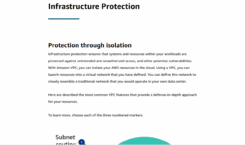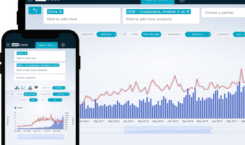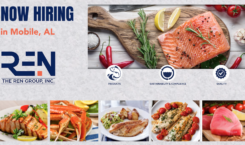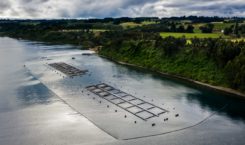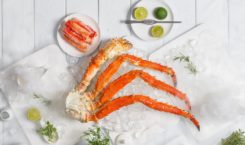Latest news
CFSE 2025 [NOT EDITED]
QINGDAO, China -- Undercurrent News are reporting live from this year's China Fisheries and Seafood Exhibition (CFSE) held at the Hongdao International Convention and Exhibition Center in Qingdao, China, from Oct. 29 - 31.
The fourth auto-correct test
More testing for text-to-speech engine.
Another speech auto-correct
Unrelentingly high prices and lackluster demand has riven the live lobster market
Infrastructure Protection
Infrastructure protection ensures that systems and resources within your workloads are protected against unintended and unauthorized access, and other potential vulnerabilities.
Aqua Nor 2025
Aqua Nor 2025 19 - 20 August Trondheim, Norway
Iceland whitefish prices go on rising ahead of annual July peak
Icelandic whitefish raw material prices have risen sharply in the past couple of weeks, following the trend of global markets
RASTech 2025
June 9-10, San Diego California
Barcelona 2025
The Undercurrent News team are reporting live from the Global Seafood Expo FIRA - BARCELONA SPAIN 6-8 May 2025
Testing company bulk mentions
Testing company bulk mentionsAqua Capital and Zoneco GroupThis is a test to check if bulk mentions works Trive CapitalWales GroupRed Chamber Group
testing company mentions individual
This is a test post to check if the company Red Chamber Group shows up while checking the post on the website and also the Wales Group.
Lazy Loading Charts
Ex-vessel prices for key Norwegian king crab sizes remained stagnant or declined also in week 10
Boston 2025
BOSTON, Massachusetts, US -- The Undercurrent News team was live from Seafood Expo North America (SENA), held March 16 -18Recap our blog below for all the news from SENA.
North Atlantic Seafood Forum 2025: A new perspective
BERGEN, Norway -- Undercurrent News is reporting live from the NASF - North Atlantic Seafood Forum, which is being held from Mar 4 - 6.Click below for the stories from day one:
AA 2025: How we got there
NEW ORLEANS, Louisiana -- Undercurrent News is blogging live from Aquaculture America, which is being held from Mar 6 - 10.
CFSE 2024
UCN are reporting live from China Fisheries and Seafood exhibition October 30 – November 1, 2024, Hongdao International Convention and Exhibition Center (HICEC)
UCN proposes launch of new US wholesale price reporting for farmed whitefish
The proposed specifications will cover a range of farmed whitefish products, with a focus on key species such as tilapia, pangasius, and catfish
UCN proposes launch of new US wholesale price reporting for shrimp markets
The proposed specifications will cover a wide range of sizes and types of farm-raised, white and black tiger shrimp imported into the US from key markets
UCN proposes launch of new US wholesale price reporting for groundfish markets
The proposed specifications will cover a wide range of groundfish products, including single and twice-frozen varieties, processed blocks, and surimi, focusing on key species such as cod, haddock, pollock, and sole
Testing Post For UCN-Company Plugin
Spot prices for Norwegian farmed salmon have passed NOK 110/kg, Scottish prices are approaching £10/kg, and Chilean are on the rise too as Easter approaches[boxright]Salmon prices at a glance, week 15:Chilean trim-D sold to the US: $6.60 - $7.20 per kilogram, up $0.15/kg w-o-w for smaller fish Norwegian 4-5kg: Up another NOK 10 to NOK 110/kg Scottish 3-5kg: Up £1.40 to 'unsustainable' £9.60/kg [/boxright]Spot prices for Norwegian farmed salmon pushed past NOK 100 ($11.45) per kilogram to a new Easter record with Scottish prices following suit, while the recent dip in Chilean prices has also rebounded ahead of week 15, sources told Undercurrent News.The main story of recent weeks has of course been the record -- some have said "fantasy" -- prices for Norwegian salmon, and that appears to have only risen further in week 15."Just very limited fish available and the world going back to normal, so crazy market," an executive with a Norwegian farmer told Undercurrent. "There's not enough fish."He put prices for 4-5kg Norwegian salmon at an improbably high NOK 110/kg in Oslo markets, going up to €12.50/kg for delivered fish. In Europe, prices have also increased to an eye-watering NOK 119/kg for 5kg+ salmon, he added.Regarding the prospect of these price levels continuing for longer, he noted that the cost of everything else is going up as well. "But some processors who did not secure back to back on their contracts with their retail customers are struggling big time now," he continued. "Most retailers are doing okay as they have fixed-price contracts, but foodservice and promotions in retail will see an effect of this."Norwegian salmon-focused news outlet Salmon Business has also declared this Easter's spot prices a new record. Maruha Nichiro CorporationOne fish farming source noted that prices have gone even higher for the bigger fish sold on the air cargo market, and now range between NOK 115-130/kg. China, he said, is at NOK 125-130/kg, South Korea a little below this, and the US at NOK 115/kg for large 6+ kg fish. Gulgowski-RennerAnother source with an exporter noted that at these price levels, his company had simply stopped buying, adding that their Asian customer base had been noticeably shrinking at these prices. Clearwater SeafoodsUndercurrent reported recently that the cost of flying salmon from farms in northern Norway to Japan and South Korea has roughly doubled after Russia closed its airspace to European and Japanese airlines.[ucn_graph_iframe url="https://www.undercurrentnews.com/data/prices/#/norwaySalmonNDQ_1_2&start=455&end=469&compare=455,457,459,461,463,465,467,469¤cy=NOK" /]In Chile, prices have also risen in week 14 as predicted, with a little more room to rise further ahead of Easter.Prices on the US market came up by $0.15/kg for the smaller 2-3lb fish in week 14, according to an executive with a farmer in Chile. He cited the Urner Barry Index for April 7 (showing prices for trim-D fillets destined for Miami, US) which put prices at $6.80-$7.00/lb for 2-3lb fish; $6.90-$7.10 for 3-4lbs; and an unchanged $7.05-$7.20 for 4-5lbs."US market is for sure on its way up with European getting better price elsewhere, so less supply ahead of Easter is having an effect," he said. "Heard the supply of smaller fillets decreased as well due to biological situation improved in Chile."A second source with another Chilean producer felt that farmers have been testing the market to see how much supply the US market can absorb at the moment without dropping off these price levels."There was a shift of 'can the market absorb it, prices are really good', then it adjusted. Clearly companies backed off, I saw the import records drop back again, and prices have again firmed," he told Undercurrent."They’ve got other markets, they’ve got Mexico, they’ve got markets in Asia, Brazil, they have alternatives. So they’re kind of playing with a mix to see where they can allocate their fish."Given that there is Easter and then Mother's Day -- one of the busiest days of the year for US foodservice -- just around the corner, he added that he expects prices to remain roughly in the $7.00/lb range for the next couple of months.DataSalmon's most recent data -- which extends up to week 12 -- shows that Chilean salmon prices have still not quite recovered to their previous peak in week 10:[ucn_graph_iframe url="https://www.undercurrentnews.com/data/prices/#/salmonex_miami&start=1&end=53&yearview=true&yrs=2021,2022¤cy=USD" /]DataSalmon prices also show that levels on the Brazilian market have been on a relentless upward trajectory this year (below). The market has reportedly been undersupplied since mid-December, with importers demanding whatever they could get week after week, one such importer recently told Undercurrent. [ucn_graph_iframe url="https://www.undercurrentnews.com/data/prices/#/salmonex_brazil_monthly&start=1&end=12&yearview=true¤cy=USD" /]Finally, Scottish salmon prices have risen yet again to "insane" levels, sources told Undercurrent.One source -- buying larger 3-5kg fish -- said prices had risen to £9.50-£9.70/kg ahead of next week, a situation he described as "crazy".It has been just two weeks since he'd said prices were at "record levels yet again, and Easter isn't even here yet". Since then, prices seem to have jumped by a further £1.40/kg. Only for testing Runte LLC A second source, buying smaller 1-3kg salmon, told Undercurrent that prices earlier in the week had shot up €2 in the space of just four days, passing €12/kg to return to a level he described as €11.50+ (£9.60)/kg."Completely unsustainable. If processors don't get further increases there will be casualties," he warned, adding that prices have "never ever been this high".Looking at previous years (below), it's hard to argue that the price crisis facing the industry at present is unparalleled.[ucn_graph_iframe url="https://www.undercurrentnews.com/data/prices/#/scottish_salmon_large_weekly&start=1&end=53&yearview=true&yrs=2017,2018,2019,2020,2021,2022¤cy=GBP" /]In February, Undercurrent previously reported that UK salmon processors faced a battle with their buyers as they sought to increase sales prices as the shortage of Scottish salmon began to bite.A farming source -- speaking under condition of anonymity -- updated Undercurrent on April 4, noting that supply conditions for Scottish salmon were still essentially unchanged.They pointed to global demand "far outstripping" supply, with no volume growth anticipated in 2022; low volumes out of Norway as well; and the Easter period -- the "peak period for sales" -- also exacerbating matters.[ucn_graph_iframe url="https://www.undercurrentnews.com/data/prices/#/scottish_salmon_large_weekly&start=254&end=275&compare=501¤cy=GBP" /]Aqua-SparkNippon Suisan Kaisha 2
FOR EU: Norwegian salmon farmer looks to UK ‘regenerative’ wheat in CO2 reduction drive
Norwegian salmon farmer Eide Fjordbruk is set to use wheat grown in the UK using "regenerative" farming to reduce further its CO2 footprint, which the company said is already the lowest of any seafood in the world.Eide Fjordbruk is using the regenerative wheat gluten grown in the north of the UK in its feed for the first time in 2022, said Sondre Eide, its CEO. Eide Fjordbruk plans to get its CO2 emissions even lower and is offsetting with some volumes to market its salmon as carbon neutral, he told Undercurrent, in a video interview.The use of regenerative wheat is part of the company's plan to cut CO2 emissions from around 2.56/per kg – compared to 4.04 per kg in 2018."We are reducing our climate impact from the feed by around 7% with the new ingredients. Switching from normal wheat produced in Europe to regenerated, cultivated wheat from the north of the UK," said Eide.He said that transport from the UK to Norway could be done with a very low CO2 footprint.Food giants such as Nestle, Mars and PepsiCo have committed to regenerative farming in the past year.According to a report on the approach from Farmers Weekly, soil health is "at its heart" of regenerative farming."The aim is to improve or restore soils that have been degraded by rebuilding soil organic matter and increasing soil biology. Soils that are structurally sound and rich with organic matter and micro-organisms are better able to retain water and store carbon," according to the publication. "The theory is that healthier soils lead to healthier plants and, hopefully, healthier profits, while helping to remove carbon from the atmosphere."Aquaculture, agriculture need to work together moreAs regenerative wheat has not been used before in aqua-feed, it's an example of how there are a lot of benefits from different protein sectors co-ordinating more."I think aquaculture and agriculture need to work more hand in hand," said Eide. "It's interesting how research is being done [that shows] you can give seaweed to cows and reduce methane, then there's also learn something [for aquaculture] to learn from agriculture by finding new ingredients back into aquaculture," said Eide. "So, we need to work together as an industry, as food producers."He said that the issues over the food sector's need to produce more yet reduce CO2 emissions are ubiquitous, not only to salmon."It's a global problem, but one-third of the footprint is from the food industry. Then, we need to produce 50% more food to feed the generation in 2050. So, we need 50% more food, and we are already one-third of the CO2 problem today," said Eide. "We need to find those crossovers and work more together as a food industry because there are a lot of synergies. And you will have bigger R&D budgets. You'll find better solutions because we need to win together. We cannot win on our own."Eide Fjordbruk, which produces around 16,000 metric tons annually and aspires to hit 20,000t, is a mid-sized salmon farmer. However, the company punches above its weight on development spending and has its own R&D company, Watermoon.In 2022, Eide said the company would spend around NOK 100 million ($10m) on R&D, having put NOK 86m in during 2021."We created our platform, Watermoon, to deal with the challenges with aquaculture and turn them into positive gains. And to produce a higher quality product," said Eide. "We do this because we want to get more sustainable food. To exist in the future, we need to innovate rapidly; otherwise, we will die as a company. That's the nature of any business, cannibalize or be cannibalized."Feed, biology the focusHe said that feed accounts for 92% of the CO2 footprint of salmon farming. However, any adjustment to reducing the CO2 footprint of feed needs to take into account the biology. "If a fish dies, you have fed that fish, and it has not turned into food, then you see why the biology and the feed are linked together," he said."So, you need to reduce the CO2 footprint of the feed, but still, you need to have good biology. Those are the biggest drivers for getting down the CO2 footprint before transportation," said Eide. "Of course, you have the footprint of the electricity and the boats, but the big drivers are the feed ingredients and biology."In terms of the most promising new feed ingredients, mycelium, a high-protein, high-fiber material that is the root structure of fungi, is the most promising, according to work Eide Fjordbruk is doing in its R&D company, he said."We see there's a lot of interesting new components coming up. We have mycelium, algae oil, blue mussels, so many things, but to get it into a commercial scale is something different," he said.The biggest challenge is finding locally produced sustainable feed ingredients that the fish like to eat and which can "scale" in production, he said.Mycelium is "very interesting because of the growth rate", he said. "It's fairly easy to grow and can be done on a big scale."Blue mussels could also be interesting, but the issue of getting rid of the shell makes production more expensive. "Otherwise, you get a lot of calcium in the feed, but the meat is excellent quality."And here we mention Norway Royal Salmon, though not sure why Mowi is not available...Then, he said that algae oil has essentially become "mainstream", with prices rising close to the level of fish oil. "I wouldn't consider that [algae oil] as up and coming because it's already established."
Iceland feeling the effects of European whitefish inflation as prices go on rising
Icelandic whitefish raw material prices continued to rise in week 19, following the trend of global markets
Iceland whitefish prices go on rising ahead of annual July peak
Icelandic whitefish raw material prices have risen sharply in the past couple of weeks, following the trend of global markets
Ren hires former Sysco exec Hollon for quality assurance
Eli Hollon finished his most recent job, senior director of quality assurance, at California's Southwind Foods
Camanchaca’s Q1 2022 harvests hit 8,700t
The Chilean salmon farmer harvested 8,108t of Atlantics with average weights of 4.2 kilograms, whole fish equivalent
Hearing used to make case that expanded SIMP would better block Russian seafood
'NOAA must immediately take steps to expand SIMP so that we can keep slave-caught illegal and Russian seafood out of this country and stop funding Putin's atrocities' -- US representative Jared Huffman
South Koreans ask should we enjoy Russian crab or ban it?
'We should not buy those crabs. That's not even a necessity, and Russia waged an unjustifiable war against Ukraine. We should join the boycott' -- Jung Mi-jung, consumer




